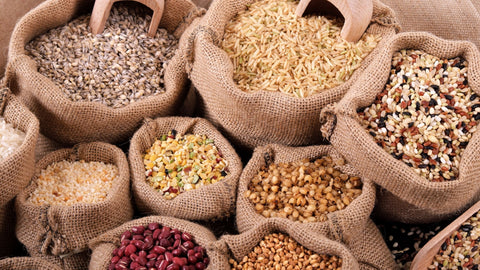Top 10 Foods to Improve Digestion
The digestive system is responsible for breaking down food into nutrients and particles the body can absorb. It is also responsible for the elimination of waste, and a digestive system that is not operating optimally can lead to a host of issues such as inflammation, constipation, diarrhea, malabsorption, and general discomfort.
Diet and lifestyle changes can help improve digestion and prevent heartburn, nausea, and the symptoms listed above. Eating foods that promote digestive health by fighting bad bacteria and promoting good bacteria in the gut is one way to improve digestion. Eating foods high in fiber that keep the gastrointestinal tract working smoothly is another way to keep your digestive system in tune. Here are 10 foods that help improve digestion and prevent adverse symptoms:
1. Yogurt

Yogurt is great for aiding digestion because the probiotic bacteria has been shown to improve the health of the gut. Probiotics help ease bloating, diarrhea, constipation, and gas, and have even been successful in reducing symptoms of irritable bowel syndrome. Not all yogurt contains probiotics, so be sure to look for the words “live and active cultures” on the package! You can learn more about foods that can prevent IBS symptoms in this article from the meal delivery service, Pure Plates.
2. Kefir

Like yogurt, kefir is a fermented dairy product that is rich in probiotics. Kefir has also been shown to improve experiences of gas, bloating, cramps, and diarrhea, and may even decrease the number of harmful bacteria in the gut as well as inflammation.
3. Whole grains

Grains are the seeds of plants called cereals. To be classified as a whole grain, the entire germ, bran, and endosperm of the grain must still be intact in the final food product. Whole grains aid in digestion in two ways:
1. They are good sources of fiber, which keeps the digestive tract moving
2. They are often rich in prebiotics, which help feed the healthy bacteria within the gut. To support digestive health, try pairing a whole grain with a source of protein and healthy fats, like this black bean and quinoa burrito!
4. Salmon

Salmon is an excellent source of omega-3 fatty acids, which reduce inflammation in those with inflammatory bowel disease and other digestive diseases. Paired with a fibrous vegetable, like in this pan seared salmon with pesto, salmon can be an excellent way to improve digestive health.
5. Peppermint

Ever wonder why many people enjoy peppermint tea after a large meal? Peppermint oil has been shown to potentially have a relaxing effect on the digestive tract, easing indigestion by helping food move through the digestive tract. It has also been shown to ease symptoms of IBS.
6. Leafy Greens

Dark, leafy greens such as broccoli, spinach, kale, and brussels sprouts are great sources of fiber and magnesium, which stimulates muscle contractions in the gastrointestinal tract to ease constipation. There is also evidence that the sugar in dark leafy greens feeds the beneficial bacteria in the gut.
7. Avocados

Avocados are rich in fiber and potassium, two nutrients that aid in digestive health and function. Avocados can help relieve constipation and may even reduce the risk for colon cancer. However, avocados are still high in fat, and may cause discomfort in some individuals if too much is eaten at once.
8. Apples

Apples have a sugar called pectin, which reduces inflammation in the colon, fights infection in the intestine, and helps bulk up stool to relieve both constipation and diarrhea. Pair apples with a source of protein to keep you satisfied between meals, this apple salad shaker is the perfect midday snack to keep your digestion in check.
9. Ginger

Research indicates ginger helps move things throughout the digestive tract quicker, and may reduce the risk for heartburn, nausea, and stomach upset. This ginger chicken may help your digestion by providing lean protein, fiber, and ginger!
10. Kimchi

Another fermented product, kimchi is made of fermented cabbage or other vegetables. The longer kimchi ferments, the greater the concentration of it’s digestion-improving probiotics. Kimchi can be enjoyed on its own or added to fried rice dishes, eggs, and atop grain bowls.
If diet changes do not seem to improve your digestion or you still experience symptoms like diarrhea or constipation, it may be time to visit your doctor and rule out digestive disease, such as inflammatory bowel or irritable bowel syndrome. Such issues may require more specific dietary interventions.
Eating an overall balanced diet that includes some of the foods above can help keep digestive issues at bay. Using a prepared meal delivery service such as Pure Plates can help you choose convenient, healthy meals designed to meet your needs. While less common, digestive issues can also lead to bloating, which can be uncomfortable. If you experience bloating, try reducing these 10 foods that make you feel bloated in addition to introducing more of these digestion-promoting foods into your diet.

